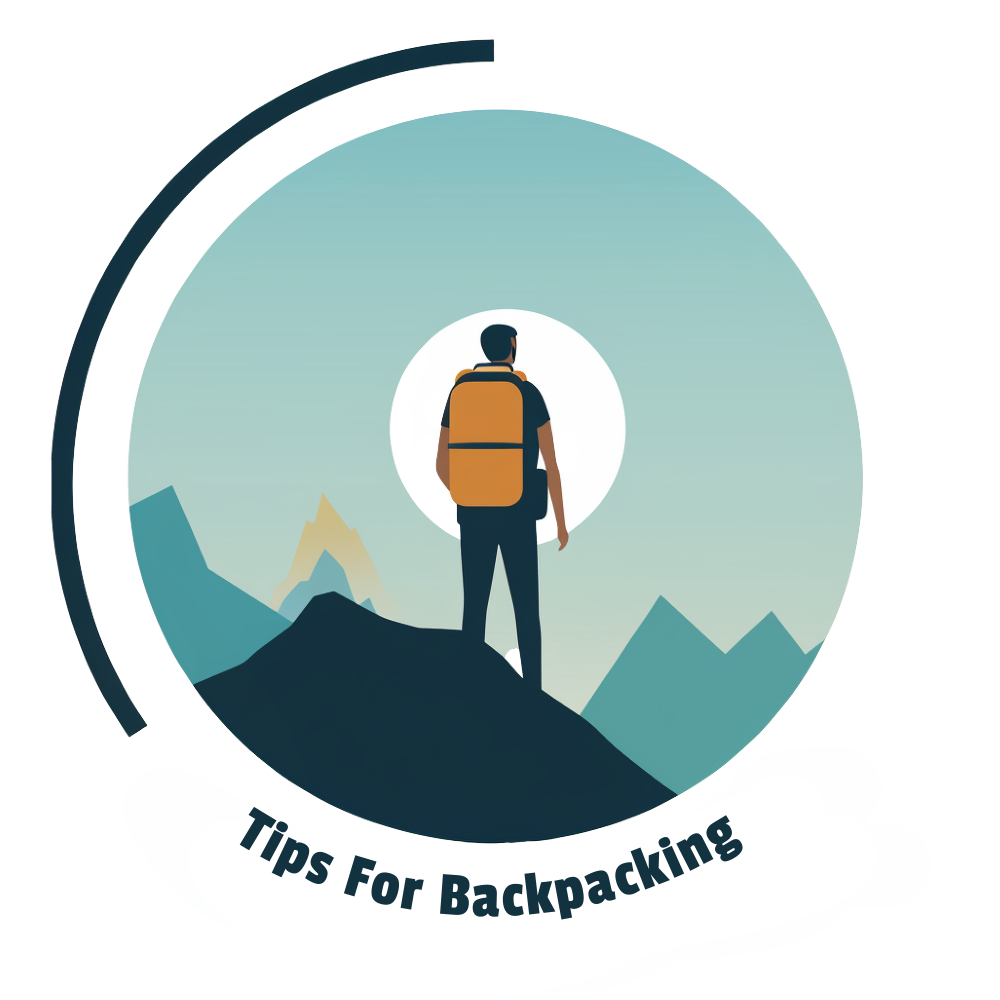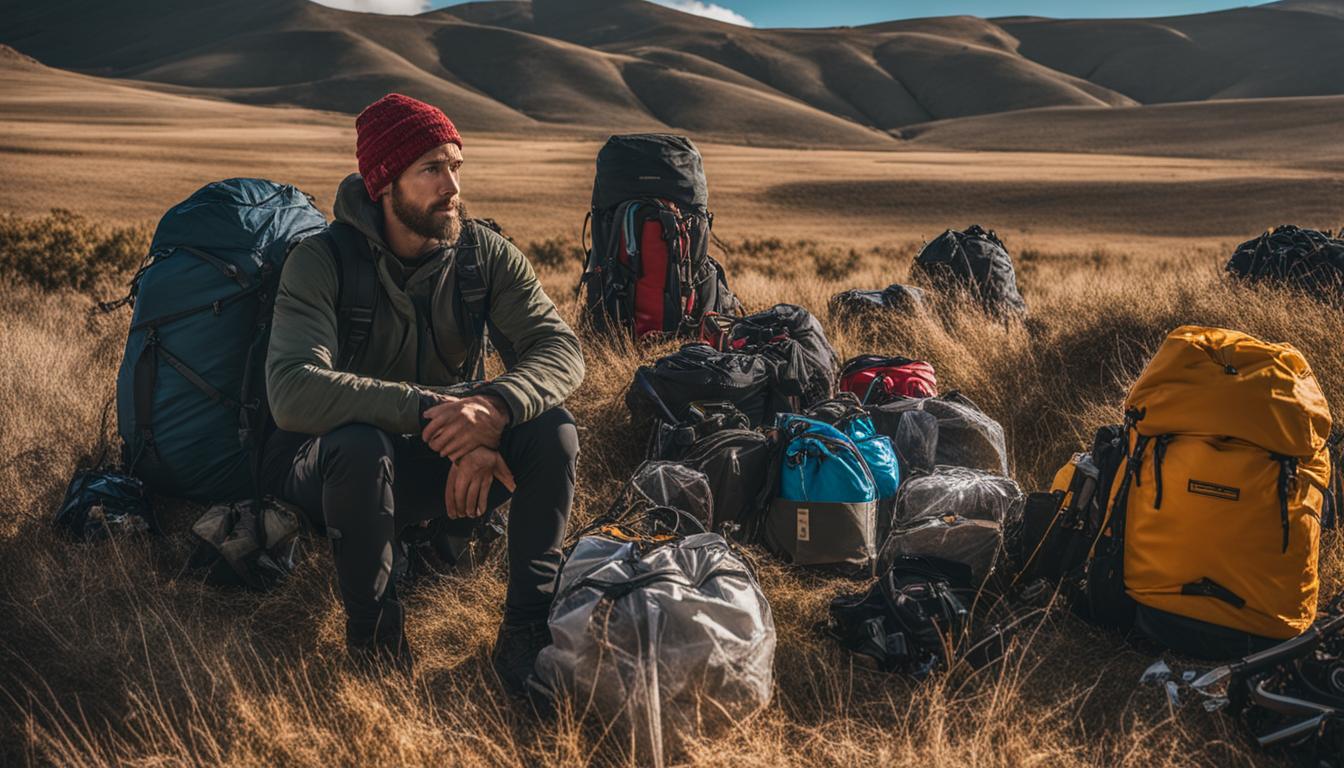When it comes to backpacking adventures, choosing gear that aligns with your sustainable values is crucial. Not only does eco-friendly backpacking equipment minimize your impact on the environment, but it also enhances your overall experience in the great outdoors. In this guide, I will explore the best sustainable gear options available on the market, discuss the importance of sustainable materials, and provide tips on how to choose and maintain your backpacking gear in a sustainable way.
Key Takeaways:
- Choosing sustainable backpacking gear is essential for minimizing your environmental impact.
- Eco-friendly backpacking equipment enhances your outdoor experience.
- Sustainable materials are important for the longevity and durability of your gear.
- Proper maintenance is crucial for preserving the sustainability of your backpacking equipment.
- By supporting brands with ethical manufacturing practices, you contribute to a more sustainable industry.
Choosing Sustainable Tents: Durable and Earth-Friendly Shelters
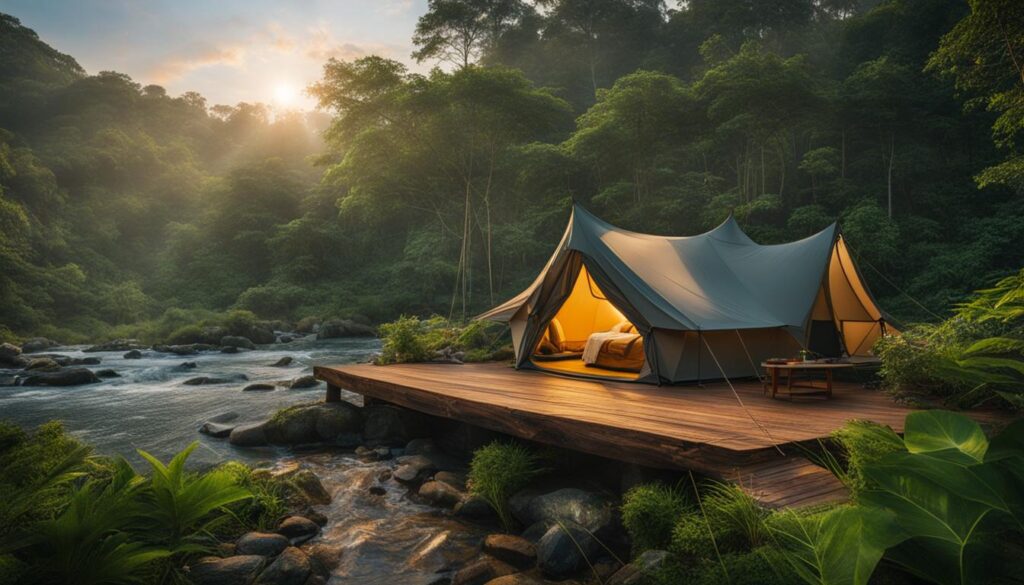
When it comes to sustainable backpacking gear, choosing a tent made from eco-friendly materials is essential. Not only does it minimize your impact on the environment, but it also ensures a more sustainable and responsible outdoor experience. By opting for tents made from recycled or sustainable fabrics, you can enjoy the great outdoors while reducing your carbon footprint.
There are various options available when it comes to sustainable tents. Look for tents made from bluesign® approved materials, which guarantee that the fabrics are free from harmful chemicals and produced with minimal environmental impact. These eco-friendly tent materials offer durability and weather resistance, ensuring a shelter that will withstand the test of time and the elements.
When choosing a durable and eco-friendly tent, consider reputable brands such as Kammok, NEMO Equipment, and The North Face. These brands prioritize sustainability in their production processes and offer a range of options tailored to different backpacking needs. From lightweight backpacking tents to spacious family camping tents, you can find a sustainable tent that suits your specific requirements.
Eco-Friendly Tent Materials
Table: Comparison of Sustainable Tent Materials
| Material | Properties | Brands |
|---|---|---|
| Recycled Polyester | Durable, breathable, and water-resistant | NEMO Equipment, The North Face |
| Organic Cotton Canvas | Natural, breathable, and weather-resistant | Kammok |
| Recycled Ripstop Nylon | Lightweight, tear-resistant, and quick-drying | Kammok, The North Face |
When investing in a sustainable tent, prioritize materials that are durable, weather-resistant, and have minimal environmental impact. By choosing a tent made from eco-friendly materials, you can enjoy the beauty of nature while preserving it for future generations.
Sleeping Bags: Rest Easy with Sustainable Choices
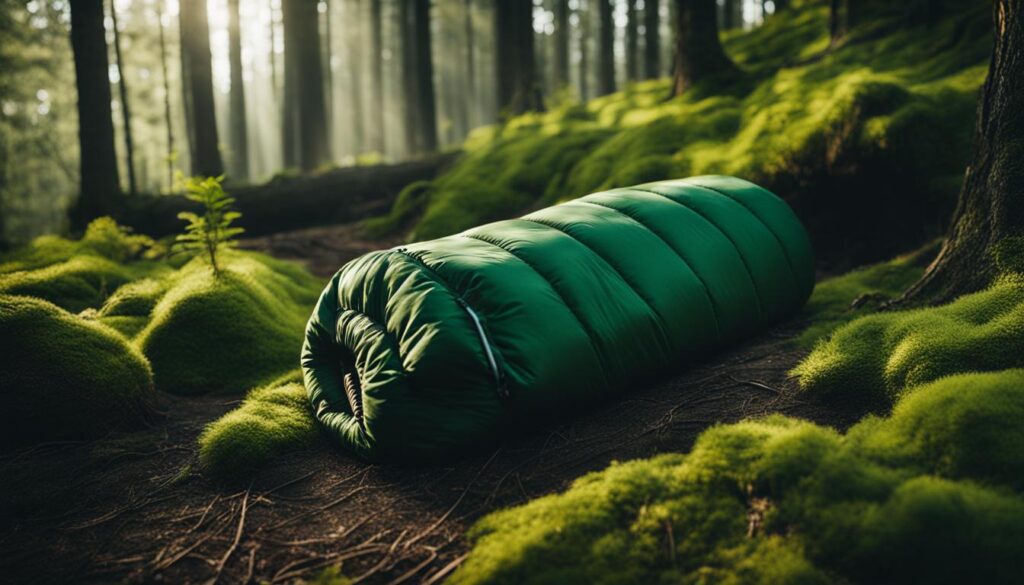
When it comes to sustainable backpacking gear, one of the most essential items is a sleeping bag. Not only does it provide warmth and comfort during your outdoor adventures, but it also plays a crucial role in minimizing your environmental impact. By choosing a sustainable sleeping bag, you can rest easy knowing that you are making an eco-friendly choice.
One key factor to consider when selecting a sustainable sleeping bag is the insulation material. Opt for sleeping bags made from eco-friendly insulation materials, such as recycled polyester or down alternatives. These materials not only offer excellent thermal performance but also help reduce waste by repurposing existing resources.
In addition to the insulation, it is important to consider the ethical manufacturing practices of the sleeping bag brands you are considering. Look for companies that prioritize fair labor conditions, sustainable sourcing, and responsible production processes. Some of the best sustainable sleeping bag brands include Sierra Designs, Mountain Hardwear, and Rab.
Eco-Friendly Insulation Materials
When it comes to eco-friendly insulation materials, there are several options to consider:
- Recycled polyester: This material is made from post-consumer plastic bottles, diverting waste from landfills and reducing the demand for virgin polyester.
- Down alternatives: These synthetic materials mimic the insulating properties of down feathers without the ethical concerns associated with animal products.
- Recycled down: Some brands offer sleeping bags filled with recycled down, which is repurposed from post-consumer and post-industrial sources.
Best Sustainable Sleeping Bag Brands
When choosing a sustainable sleeping bag, it is important to consider reputable brands that prioritize sustainability in their production processes. Here are some of the top sustainable sleeping bag brands:
| Brand | Highlights |
|---|---|
| Sierra Designs | – Uses responsibly sourced down – Committed to sustainable manufacturing practices |
| Mountain Hardwear | – Offers recycled polyester insulation – Collaborates with ethical suppliers and factories |
| Rab | – Uses recycled down and synthetic insulation – Promotes fair labor conditions throughout the supply chain |
By choosing a sustainable sleeping bag with eco-friendly insulation materials and supporting ethical brands, you can ensure a restful night’s sleep while minimizing your environmental impact. Rest easy knowing that you are making a positive difference for both your outdoor adventures and the planet.
Sleeping Pads: Rest Comfortably While Reducing Your Environmental Impact
When it comes to sustainable backpacking gear, it’s crucial to prioritize your sleep comfort while also minimizing your environmental impact. Choosing an eco-friendly sleeping pad can help you achieve both goals. Look for sleeping pads made from sustainable insulation materials, such as recycled foam or responsibly sourced fabrics. These materials not only provide excellent insulation and cushioning but also reduce the overall carbon footprint of your outdoor adventures.
Responsible manufacturing practices are another key aspect to consider when selecting a sustainable sleeping pad. By choosing brands that prioritize ethical production methods, you can ensure that your purchase supports environmentally conscious initiatives. Look for certifications such as bluesign® or Fair Trade, which indicate that the brand promotes sustainable practices throughout its supply chain.
When it comes to top brands for sustainable sleeping pads, NEMO Equipment and GSI Outdoors are worth considering. NEMO Equipment offers a range of sleeping pads made from recycled materials, including foam and fabrics. These pads are designed for durability and comfort, ensuring a good night’s sleep while minimizing your carbon footprint. GSI Outdoors also offers eco-friendly sleeping pads that prioritize sustainability without compromising on performance. Their pads are made from recycled foam and feature innovative designs that provide excellent support and insulation.
To summarize, when choosing a sustainable sleeping pad, look for options made from eco-friendly insulation materials, manufactured using responsible practices. Consider brands like NEMO Equipment and GSI Outdoors that prioritize sustainability and offer durable, high-performance sleeping pads. By making conscious choices with your sleeping gear, you can rest comfortably while reducing your environmental impact.
Backpacks: Carry Your Gear Responsibly
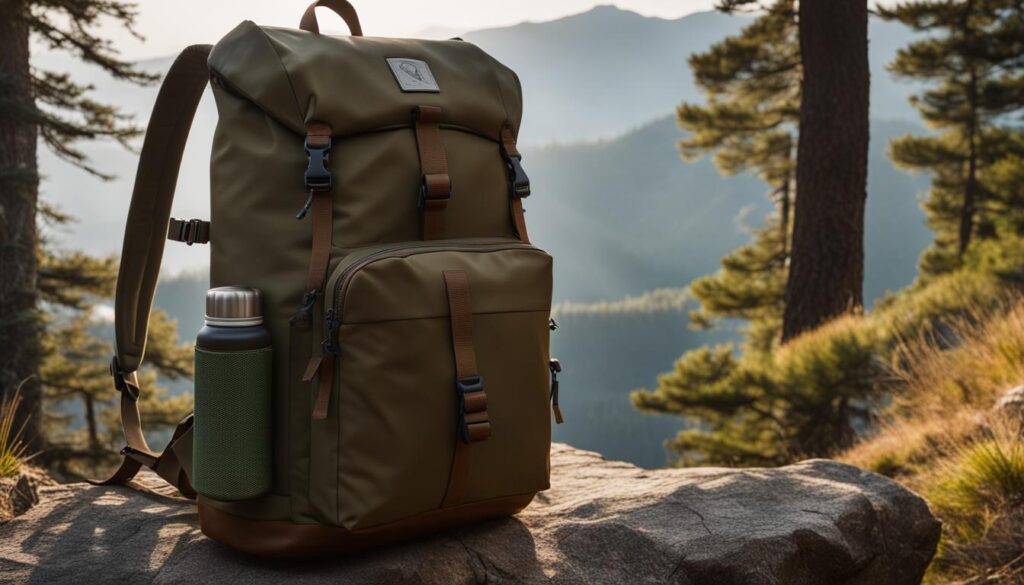
When it comes to sustainable backpacking gear, choosing the right backpack is crucial. Not only does it need to be durable and comfortable, but it should also be made from environmentally-friendly materials and manufactured ethically. By selecting a sustainable backpack, you can minimize your impact on the environment and support brands that prioritize sustainability.
When searching for sustainable backpack options, look for materials such as recycled nylon or organic cotton. These materials are eco-friendly and reduce the use of new resources. Patagonia and Mountain Hardwear are two notable brands that offer a range of sustainable backpacks. They are committed to using recycled materials and following ethical manufacturing practices, ensuring that their backpacks are not only eco-friendly but also of high quality and built to last.
| Brand | Materials Used | Features |
|---|---|---|
| Patagonia | Recycled nylon | Water-resistant, multiple compartments |
| Mountain Hardwear | Organic cotton | Ergonomic design, adjustable straps |
Choosing a sustainable backpack not only benefits the environment but also ensures that you have a reliable and functional gear for your backpacking adventures. So, next time you’re in need of a new backpack, consider opting for a sustainable option that aligns with your values. By doing so, you’ll be carrying your gear responsibly and supporting brands that are making a positive impact on the planet.
Utensils & Cooking: Make Sustainable Choices in the Kitchen

When it comes to cooking and dining while backpacking, it’s important to make sustainable choices in your utensils and cooking equipment. By opting for eco-friendly options and supporting brands with ethical manufacturing practices, you can reduce your environmental impact and enjoy your meals in a more sustainable way.
One key consideration is choosing eco-friendly camping utensils. Look for utensils made from durable and biodegradable materials, such as stainless steel or bamboo. These materials are not only long-lasting but also have a lower environmental footprint compared to single-use plastic utensils. Brands like MSR and BioLite offer a range of eco-friendly camping utensils, including forks, spoons, and knives, that are designed for efficiency and durability.
“Using eco-friendly camping utensils is a simple yet effective way to reduce waste and minimize your impact on the environment while enjoying your meals in the great outdoors.”
In addition to utensils, consider investing in sustainable cooking equipment. Look for cookware made from materials like stainless steel or cast iron, which are known for their durability and longevity. These materials can withstand high temperatures and are less likely to be damaged, reducing the need for frequent replacements. Brands like GSI Outdoors offer a variety of sustainable cookware options, including pots, pans, and cooking sets, that are designed to be lightweight, compact, and efficient.
Eco-Friendly Camping Utensils
| Brand | Material | Product |
|---|---|---|
| MSR | Stainless Steel | Camping Utensil Set |
| BioLite | Bamboo | Eco-Friendly Spork |
Sustainable Cooking Equipment
| Brand | Material | Product |
|---|---|---|
| GSI Outdoors | Stainless Steel | Cookware Set |
By choosing eco-friendly camping utensils and sustainable cooking equipment, you can minimize waste and contribute to a more sustainable outdoor experience. These small choices can make a big difference in reducing your environmental impact while still enjoying delicious meals during your backpacking adventures.
Eco-Friendly Water Bottles and Sustainable Power Solutions
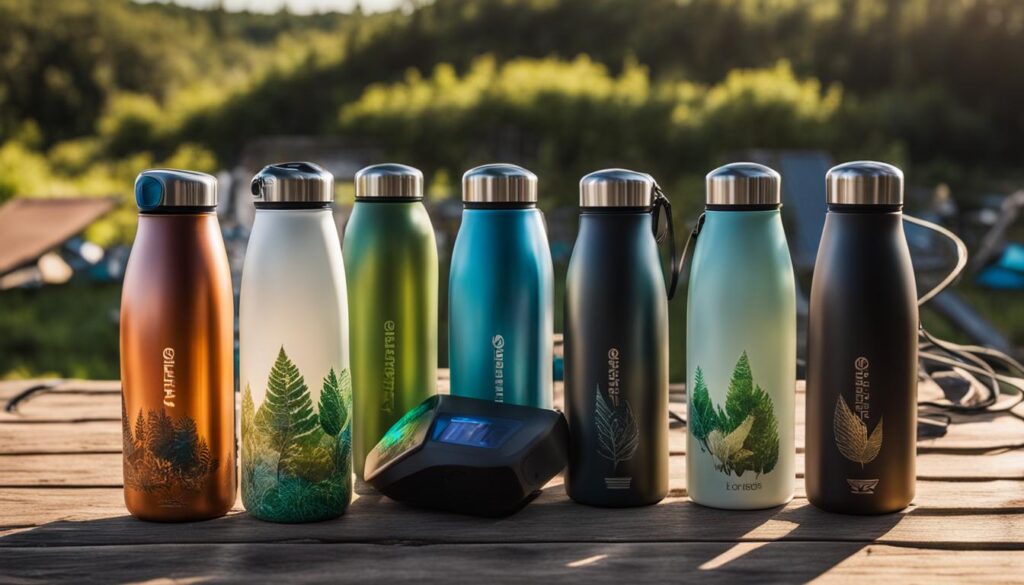
When it comes to sustainable backpacking gear, choosing eco-friendly water bottles and power solutions is key. By opting for products that prioritize ethical manufacturing practices and sustainable materials, you can reduce your environmental impact while staying hydrated and powered up on your outdoor adventures.
Eco-Friendly Water Bottles
Choosing a reusable water bottle made from eco-friendly materials is a simple yet impactful way to minimize waste and lower your carbon footprint. Look for water bottles made from recyclable materials like stainless steel or glass, as they are both durable and environmentally friendly. Brands like Klean Kanteen and Hydro Flask offer a wide range of eco-friendly water bottle options that are not only sustainable but also stylish and functional.
Sustainable Power Solutions
When it comes to powering your devices in the great outdoors, opting for sustainable solutions is essential. Brands like Anker and Goal Zero offer portable power solutions that prioritize sustainability in their manufacturing processes. Look for solar-powered options that harness the sun’s energy to keep your devices charged while minimizing your reliance on disposable batteries. By choosing sustainable power solutions, you can enjoy the convenience of technology without harming the environment.
| Brand | Product | Key Features |
|---|---|---|
| Klean Kanteen | Wide Mouth Stainless Steel Water Bottle | – Made from 18/8 food-grade stainless steel – Durable and BPA-free – Wide mouth for easy filling and cleaning – Compatible with most water filters |
| Hydro Flask | Vacuum Insulated Stainless Steel Water Bottle | – Keeps drinks cold for up to 24 hours and hot for up to 12 hours – Made from 18/8 pro-grade stainless steel – TempShield™ insulation eliminates condensation – Durable and BPA-free |
| Anker | PowerCore Solar Portable Charger | – High-efficiency solar panel converts sunlight into power – Provides emergency charging for smartphones, tablets, and more – Waterproof and designed for outdoor use – Built-in safety features to protect your devices |
| Goal Zero | Yeti 400 Lithium Portable Power Station | – Powerful lithium battery with 428Wh capacity – Multiple charging options (solar, wall, car) – AC, USB, and 12V outputs for charging a variety of devices – Lightweight and portable design |
When choosing water bottles and power solutions for your backpacking adventures, consider the environmental impact of the materials used, the durability of the products, and the brand’s commitment to sustainability. By making conscious choices, you can enjoy the great outdoors while minimizing your ecological footprint.
Conclusion
After exploring the wide range of sustainable backpacking gear options available, it is clear that choosing eco-friendly outdoor equipment is essential for minimizing our impact on the environment. By opting for gear made from recycled or responsibly sourced materials, we can enjoy our adventures while preserving nature for future generations.
When selecting sustainable backpacking gear, it is important to prioritize durability. Look for brands that offer products designed to withstand the rigors of outdoor exploration, ensuring that your gear will last for many adventures to come.
In addition to choosing sustainable gear, proper maintenance is crucial for maximizing the lifespan of your equipment. Regularly clean and store your gear properly, following the manufacturer’s instructions. This will not only extend the life of your gear but also reduce the need for replacements, further reducing your environmental impact.
By making conscious choices and investing in high-quality, sustainable backpacking gear, we can enjoy the great outdoors while treading lightly on the planet. Let’s continue to support brands that prioritize eco-friendly practices and take steps towards a more sustainable future.
FAQ
What is the importance of choosing sustainable backpacking gear?
Choosing sustainable backpacking gear helps minimize your impact on the environment and ensures a more eco-friendly outdoor experience.
What are some eco-friendly materials to look for in a tent?
Look for tents made from recycled or sustainable fabrics, such as bluesign® approved materials, which are free from harmful chemicals.
Which brands offer sustainable tents?
Some reputable sustainable tent brands include Kammok, NEMO Equipment, and The North Face.
What materials should I look for in a sustainable sleeping bag?
Look for sleeping bags made from recycled or responsibly sourced materials, such as recycled water bottle insulation or synthetic insulation made from recycled polyester.
Which brands offer sustainable sleeping bags?
Sierra Designs, Mountain Hardwear, and Rab are reputable brands that offer sustainable sleeping bag options.
What materials are used in eco-friendly sleeping pads?
Look for sleeping pads made from environmentally-friendly materials, such as recycled foam or sustainably sourced fabrics.
Which brands offer sustainable sleeping pads?
NEMO Equipment and GSI Outdoors are brands that offer eco-friendly sleeping pads.
What materials should I look for in a sustainable backpack?
Look for backpacks made from recycled or responsibly sourced materials, such as recycled nylon or organic cotton.
Which brands offer sustainable backpack options?
Patagonia and Mountain Hardwear are brands known for their commitment to sustainability and offer a range of eco-friendly backpack options.
What materials are used in eco-friendly utensils and cooking equipment?
Look for utensils made from durable and biodegradable materials, such as stainless steel or bamboo.
Which brands offer eco-friendly camping utensils and cooking equipment?
MSR and BioLite are brands that offer sustainable options for outdoor chefs.
What materials should I look for in a sustainable water bottle?
Look for water bottles made from recyclable materials, such as stainless steel or glass.
Which brands offer eco-friendly water bottle options?
Klean Kanteen and Hydro Flask are reputable brands that offer sustainable water bottle options.
What are some sustainable power solutions for backpacking?
Consider brands like Anker and Goal Zero, who offer solar-powered options for portable power.
